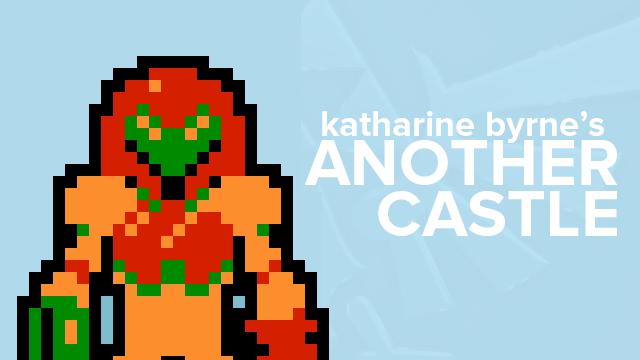
When I began reading Robinson Crusoe for the first time last year, there was one thing I just couldn’t get out of my head. Instead of nodding thoughtfully at the novel’s models of religion or allegories of human evolution, my thoughts were somewhere else entirely. In fact, the only thing I could think about when trying to admire Crusoe’s defiant struggle against the elements and his own sanity, was just how similar Robinson Crusoe was to Metroid.
Now as ridiculous as that might sound, bear with me for just one moment. As you may well know, Robinson Crusoe is a novel about a man who gets shipwrecked on an island just off the coast of South America. During his time there, Crusoe learns how to hunt, grow food, raise animals, and make his own weapons and tools. He’s the picture of human perseverance, and he manages to carve a life out for himself using nothing but his own wits and resources for nearly thirty years. But one day he discovers a tribe of cannibals on his island and manages to save one of their prisoners. After killing the man’s captors, Crusoe names his new companion Friday after the day of the week on which he was rescued, and makes him his dutiful servant. Friday soon starts to lose his taste for flesh under Crusoe’s tutelage, and he quickly becomes inseparable from his master. Together they then save two more prisoners when the cannibals return, and finally escape the island for good when they rescue a passing ship from a crew of mutineers.
Contrast this with the story of the early Metroid games, and you’ll see that they also tell a tale of a lone hunter who “makes” (or upgrades) their own weaponry, wipes out blood-thirsty foes, and befriends their mortal enemy. Of course, Samus doesn’t exactly book-end her story with owning a plantation or fending off a pack of wolves in the Pyrenees, but there are certainly quite a few interesting comparisons to be drawn between our two protagonists if we dig deep enough (and may even shed some light on Samus’s portrayal in some of the more recent instalments in the franchise as well). It’s something the literary world calls “intertextuality”— a kind of referencing system which allows different texts to inform each other about certain themes or interpretations– and today I’ll be doing exactly that with Metroid and Robinson Crusoe. A little unconventional, yes, but you might be surprised by what this eighteenth century novel can teach us about Nintendo’s top bounty hunter.
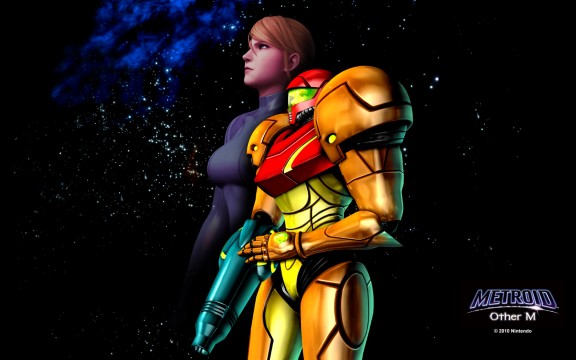
Yep, we’re going to be taking about that game as well.
I’d like to start off by taking a preliminary look at each protagonist as we know them best, or more specifically, before each of them starts “speaking”. I think we all felt a little betrayed when Samus opened her mouth in Metroid: Other M, but as I’ve said on previous occasions, I don’t think Other M would have worked without her voice. You may have loved it, you may have hated it, but when it’s a story about coming to terms with one’s past, you can’t really do that effectively without some sort of input from the main character.
Robinson Crusoe, on the other hand, arguably speaks from the very first word on the page– the entire novel is, after all, narrated in the first person– but despite this he’s actually very much like Samus for the majority of the story. He’s alone in the wilderness for thirty-odd years with no one to speak to except us, the reader (and a parrot), and I found him to be quite an amiable character until he met Friday. I marvelled at his ingenuity as he taught himself how to make bread and rear goats from scratch, and I found myself strangely humbled by his strength and unbreakable optimism as he began to grapple with the meaning of his survival. He may not count himself as any kind of hero, but like Samus, he is heroic in the way he manages to simply keep going and keep succeeding against the odds.
Yet Crusoe’s quiet heroism suddenly transformed into a vile breed of arrogance as soon as Friday arrived on the scene, and I was utterly appalled that his first thought upon seeing Friday (who’s fleeing for his life at this point) was as follows:
“It came now very warmly upon my thoughts, and indeed irresistibly, that now was my time to get me a servant, and perhaps a companion, or assistant; and that I was call’d plainly by Providence to save this poor creature’s life.”
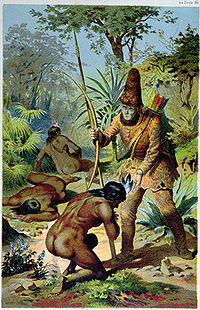 Perhaps it’s a consequence of late-seventeenth and early-eighteenth century ideas on slavery and British colonialism; perhaps it’s a mere extension of Crusoe’s obsession with conquering everything life throws at him (he also names himself King of “his island” and designates everyone he rescues as “his subjects”), but note the order of those words. It’s “servant” first, then “companion”, and even then “companion” is prefixed with a “perhaps”, indicating both its initial improbability as well as its relative unimportance when compared to the primary objective of “getting a servant”.
Perhaps it’s a consequence of late-seventeenth and early-eighteenth century ideas on slavery and British colonialism; perhaps it’s a mere extension of Crusoe’s obsession with conquering everything life throws at him (he also names himself King of “his island” and designates everyone he rescues as “his subjects”), but note the order of those words. It’s “servant” first, then “companion”, and even then “companion” is prefixed with a “perhaps”, indicating both its initial improbability as well as its relative unimportance when compared to the primary objective of “getting a servant”.
In fact, it was the same knee-jerk reaction I experienced when Samus first encountered Adam Malkovich in Other M. Before then I had always thought of Samus as being a highly capable warrior whose strength and fearless determination were her defining features. But when she too saves Adam and his platoon from the lethal Brug Mass early on in Other M, her subsequent reaction couldn’t have been more different. Instead of going on a Crusoe-esque power-trip, Samus actually becomes a kind of Friday figure. Much like Friday bending his knee in subjugation as soon as Crusoe saves his life, Samus retreats back into her power suit and subjects herself to Adam’s rule. This is also reinforced by the game itself in the way it handles its weapon upgrades, with Samus effectively only becoming “re-educated” in her abilities when Adam authorises their use.
Both reactions could be said to be out of character to what we’ve just read or played, but when you’re trying to pick the lesser of two evils, I think Samus’s response is perhaps the more favourable one. Crusoe takes it upon himself to completely change everything about Friday’s personality from his cannibalism to his religion, and while Friday is clearly in need of some education– the reason he was captured was because his tribe lacked the technology of canoes– that doesn’t change the fact that there’s something fundamentally objectionable about Friday’s first new word being “Master”.
It’s equally objectionable (and insulting) that Samus needs to be re-educated in her abilities, but placing herself under Adam’s command actually enables a more crucial kind of re-education that she might not have been able to undertake otherwise. As I said earlier, Other M is about Samus coming to terms with her past, not only with the infant Metroid (more on that in a minute) but also her relationship with Adam. Acting out and disobeying orders was what led her to become a bounty hunter in the first place, and subjecting herself to Adam’s rule again seems to be the only way she can identify and reflect on the mistakes she made as a young officer. More importantly, it also gives her the chance to try and rectify those errors and past regrets. The ensuing narrative may take her character to absurd and illogical extremes within the course of the story, but while many fans complained that Other M was a complete betrayal of Samus’s character, it’s also arguably what she’s been all along– she just didn’t have anyone else’s authority to challenge in the intervening years. Moreover, her choice not to go “full-Crusoe”, so to speak, in Other M provides an interesting counter-point to how she managed her relationship with the real Friday of Metroid’s story, the infant Metroid from Metroid II: Return of Samus.
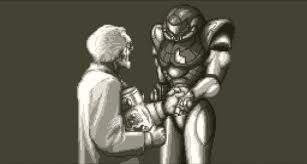
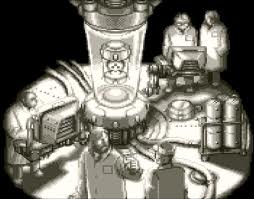
Here the shoe is very much on the other foot and she’s just as self-serving as Crusoe when she first encounters the newly-hatched larva on SR388. Despite disobeying orders again and taking the Metroid back on board her ship, her first actions aren’t to educate or truly befriend this creature that follows her around “like a lost child”. Instead, Samus “personally [delivers] it to the Galactic Federation research station at Ceres so scientists could study its energy producing qualities”. So states the opening of Super Metroid, and Samus even shakes hands with the scientists over it, like its some kind of sordid transaction. This is perhaps even worse than thinking about “getting a servant” during said servant’s moment of dire peril, for even someone as cold-hearted as Crusoe can recognise Friday’s loyalty and sincerity:
“But I needed none of all this precaution; for never man had a more faithful, loving, sincere servant, than Friday was to me; without passions, sullenness or designs, perfectly oblig’d and engag’d; his very affections were ty’d to me, like those of a child to a father; and I dare say, he would have sacrificed his life for the saving mine, upon any occasion whatsoever; the many testimonies he gave me of this, put it out of doubt, and soon convinc’d me, that I needed to use no precautions , as to my safety on his account.”
For a man who willingly abandoned his family to sail the world, shows little outward expression, and finds Friday’s exuberance both strange and excessive when he’s reunited with his father, he nevertheless welcomes this “poor savage” into his life, and he even admits that he “began really to love the creature” shortly after he rescued him.
Samus, on the other hand, doesn’t show quite the same tenderness toward the infant Metroid and simply abandons it to the scientists, leaving “to seek a new bounty to hunt” when she’s “satisfied that all was well”. Any supposed maternal instinct is wholly absent from these few scenes, and it’s only when Ridley steals the Metroid and plans to use it for evil yet again that she becomes concerned.
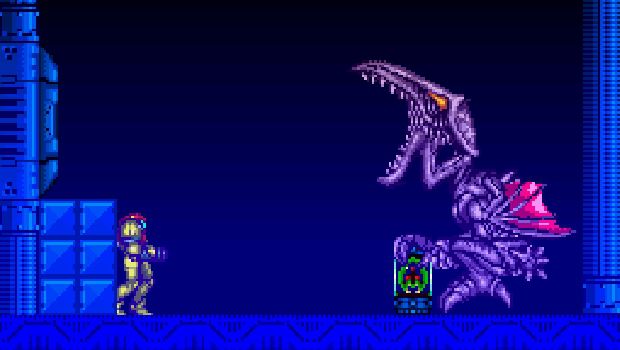
Mourning her lost child, or mourning the lost chance to exploit the Metroid for the good of humanity?
So where does this leave our heroine in her Friday-Crusoe complex? Personally, I think Other M went a little overboard with its allusions to both “the baby” and lost parenthood, but her progression from an even more callous version Crusoe to a reluctant kind of Friday reinforces the game’s main theme of her trying overcome her past. Looking at it this way, it’s perhaps a little more plausible that she does in fact need another education, not only to accept the infant Metroid’s death but to learn from her own carelessness. By erring on the side of Friday, it demonstrates a sense of progression in her character, even if it isn’t a wholly successful one.
Some may argue that she never needed to change at all, but I think framing her development through these two characters may just be able to explain why she did. By the end of Robinson Crusoe, I almost found Crusoe himself to be inhuman, too distant and remote compared with the more joyful and emotive Friday, and he wasn’t at all the same man I admired at the beginning of the novel. I don’t necessarily like how the developers executed the change in Samus’s character, but I nevertheless think that adding a bit of Friday’s humanity to her character was a step in the right direction. Nothing is ever gained by remaining constant, and it’s not as if Other M has now set the standard for Samus in the future. It may not make total sense in the context of the Prime games, but hopefully Other M won’t be remembered for all the wrong reasons when Samus comes to begin her next adventure.




 ShareThis
ShareThis






